[ad_1]
Due to the pandemic, working from home went mainstream in 2020 — but the trend is far from over.
Neon / Via Giphy / giphy.com
In a survey conducted by the Conference Board, a research organization, over 75% of US HR executives surveyed said that before the pandemic less than 10% of their employees worked primarily from home (at least three days a week). That same survey found that 77% of respondents expect their employees to work primarily from home in the future.
*Cue sigh of relief from PJ lovers everywhere.*
Some industries are jumping on the bandwagon, offering jobs that will remain remote long after the pandemic is over.
IFC / Via Giphy / giphy.com
These are the industries that posted the most remote jobs in 2020 (plus the skills and education that employers are looking for).
Spyglass Entertainment / Via Giphy / giphy.com
1.
Computer and IT
PBS / Via giphy.com
Long before working from home was a thing, the tech industry embraced remote work — and it didn’t slow hiring in 2020. When hiring for these roles, managers like to see soft skills like active listening and critical thinking and general computer know-how. Entry-level postings call for customer support know-how and experience working with computers, whereas more advanced positions might require a bachelor’s in computer science or even a master’s degree.
If you’ve got some time to spare, you can also check out sites like Codecademy and freeCodeCamp, which offer free education that can help kick-start a new career in tech.
Common job titles: information technology specialist, solutions architect, systems engineer, systems administrator, technical support, and quality analyst.
Here are some examples of computer and IT jobs for folks on the newer end of this field:
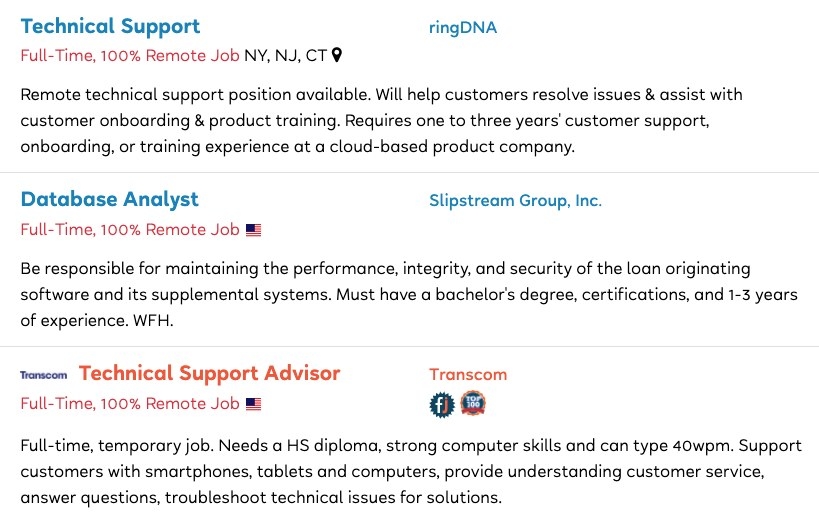
FlexJobs
2.
Medical and Health
ABC / Via Giphy / giphy.com
It’s not wildly shocking that jobs in healthcare skyrocketed after the onset of the pandemic; but unlike computers and IT, this industry tends to be a bit newer to the “work-from-home life” phenomenon. Jobs might include everything from online therapists and doctors to roles that help people navigate insurance claims and billing.
Some jobs might require a doctorate degree or a state medical board license, while other support positions ask for a bachelor’s degree and experience in the industry.
Common job titles: healthcare information specialist, medical transcriptionist, medical billing, research scientist, pharmaceutical representative, and insurance representative.
3.
Project Management
MTV / Via Giphy / giphy.com
It takes a lot more than communication and organization to manage a project. Employers also look for candidates who work well (and efficiently) with various people and have a handle on various software programs (like computer-aided design and integrated development environment software).
Most companies looking for a project manager ask for a bachelor’s degree and several years of experience “owning” a project, but there are also some support positions looking for people just starting out.
Common job titles: project manager, program manager, business analyst, research coordinator, and enterprise consultant.
Here’s what entry-level project management job listings might look like:
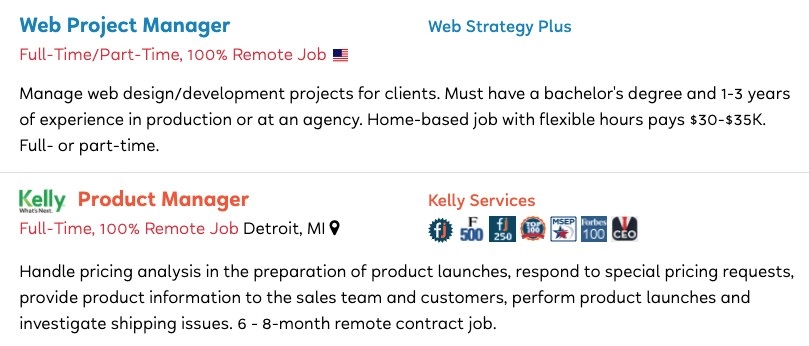
FlexJobs
4.
Sales
TriStar Pictures / Via Giphy / giphy.com
These days, most sales are made on the phone, by email, or online — channels that lend themselves to working hard from the couch. In addition to soft skills like assertiveness and influential leadership, it helps to have a history in sales and marketing, and experience working with customer relationship management software.
Sales is one of those fields where experience often trumps education, so don’t fret if you skipped college. Many job postings require a bachelor’s degree, while others only specify “some college” or hone in on sales skills and experience.
Common job titles: lead generation, business development, account executive, and anything with sales (or often, marketing) in the title.
This is what a job might look like for someone who’s just starting out:
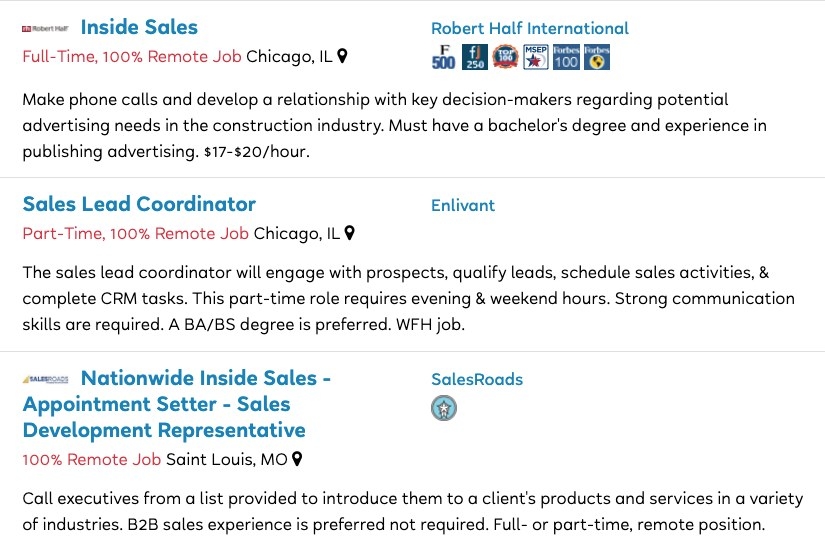
FlexJobs
5.
Accounting and Finance
NBC / Via Giphy / giphy.com
People who work in accounting and finance help others keep their books in order and manage their money — things that can easily be done via email and phone.
To explore a career in this industry, you’ll most likely need an applicable bachelor’s degree, while some jobs are looking specifically for people who already have payroll experience or license as a certified public accountant. Either way, jobs in the finance world are typically suited to people who are good at math and are deadline-driven.
Common job titles: finance manager, auditor, controller, collection agent, bookkeeper, accountant, and certified public accountant.
6.
Customer Service
Starz / Via giphy.com
If you naturally enjoy helping others and being supportive, that’s a start. But to land a job in this growing remote industry, employers also like to see some supplementary sales and marketing know-how, killer communication skills, and computer proficiency (which should be a given in any WFH gig).
A bachelor’s degree may be a bonus but isn’t always required. Most job postings seem to be looking for certain skill types and experience over a high-level education.
Common job titles: customer service representative, search for customer care associate, contact center agent, and client service representative.
This is what an entry-level position in customer service might look like.
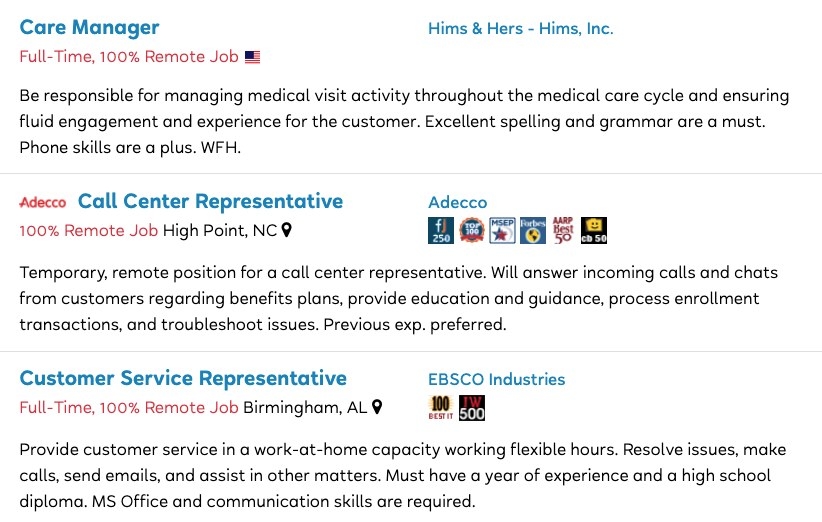
FlexJobs
7.
Marketing
AMC / Via Giphy / giphy.com
Marketing is a broad field that can include everything from developing a brand’s identity to managing a company’s social media accounts, but the skills employers look for across the board tend to be the same: Influential leadership, assertiveness, and relationship building are all key, and in the remote world, you need to be able to do them all from home.
When it comes to education, most positions are looking for someone who’s completed their bachelor’s degree (bonus if you studied marketing!), while higher-level (and higher-paid) jobs may ask for a master’s degree.
Common job titles: business development manager, advertising manager, and pretty much anything with marketing (or sometimes, sales) in the job title.
8.
Education and Training
ABC / Via Giphy / giphy.com
This growing work-from-home industry looks for people who tend to be cooperative, practical, patient, and creative; although employers also like to see candidates with the technical know-how and topic expertise needed to teach and train others online. And if you’re interested in educating others, chances are you’ll need to be highly educated yourself. Certain roles — at universities, for example — will require a doctorate degree, while other education and training jobs might only ask for a bachelor’s degree.
Common job titles: teacher, instructor, coach, tutor, faculty, curriculum developer, and paraprofessional, in addition to educator and trainer.
9.
Business Development
Universal / Via Giphy / giphy.com
Business development is all about helping companies improve, and it takes great relationship building skills and confident decision-making to help a company grow. This industry also looks for people with management, marketing, and administration experience who can help businesses build an empire (from the comfort of home).
Like the sales industry, some jobs in business development might specifically ask for a bachelor’s degree, while others prefer to hire people with oodles of experience.
Common job titles: account executive, account director, business manager, and enterprise manager.
10.
Administrative
Comedy Central / Via Giphy / giphy.com
A career in administration lends itself to remote work (setting up calls and organizing electronic paperwork can easily be done from home), but employers look for people who are naturally supportive and service-oriented (and solid task managers). A bachelor’s degree might be called for, but often a high school diploma, GED, or associate’s degree is all that’s required.
Common job titles: virtual administrative assistant, executive assistant, and office manager.
This is what an entry-level job in administration might look like.
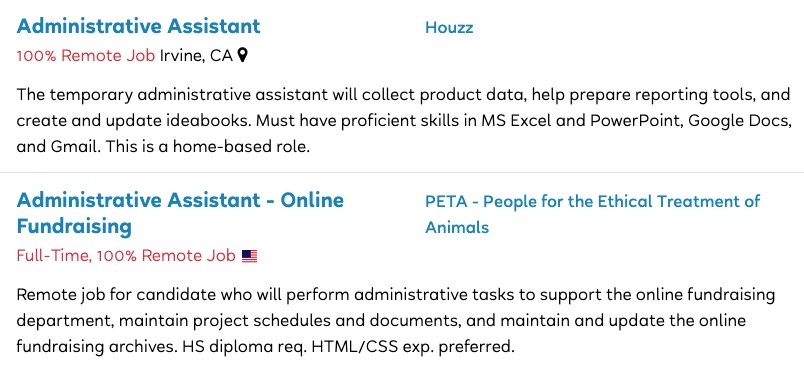
FlexJobs
11.
Consulting
Ariana Grande / Via Giphy /giphy.com
Consulting is a broad industry; but in general, consultants offer their unique perspective to help a company succeed and improve. Managers like to see candidates who bring collaboration, assertiveness, and leadership to the table — and likely have a proven track record too.
This field is less about the degree and more about the experience. So if you’re a nonprofit expert, for example, you might be able to land a job helping a new nonprofit strategize future growth or operations (no degree needed).
Common job titles: consultant, coach, business solutions analyst, executive trainer, and business adviser.
12.
Mortgage and Real Estate
Netflix / Via Giphy / giphy.com
Careers in mortgage and real estate involve helping people buy or sell property. To do this job, you don’t have to check in to an office, but you’ll likely need experience managing the legal and financial aspects of property transfer and a natural tendency toward influential and inspirational leadership, assertiveness, and decision-making.
If you don’t have a ton of formal education, this industry is an easy one to slip into. Many jobs ask for a high school diploma, GED, or “some education,” while certain higher-level positions may require a bachelor’s degree or a real estate license.
Common job titles: real estate agent, appraiser, timeshare and vacation rental representative, leasing agent, asset manager, mortgage manager, and mortgage analyst
Here’s what an early-career position in mortgage and real estate might look like:
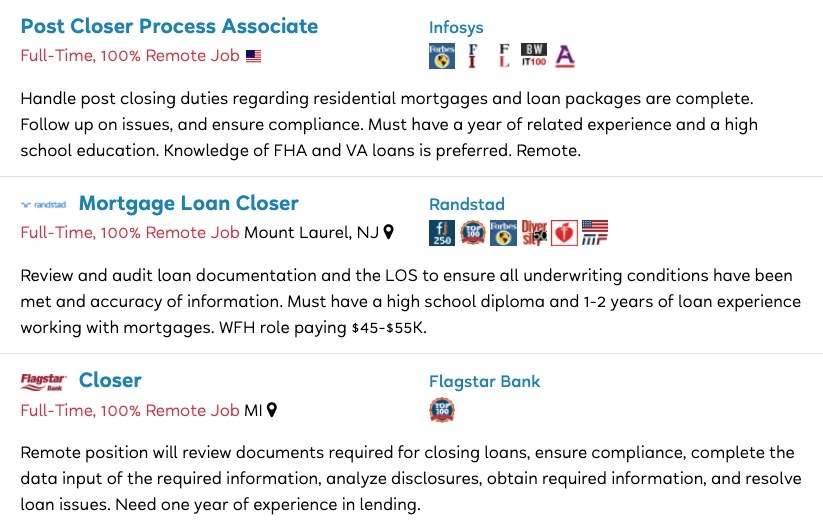
FlexJobs
13.
Internet and E-commerce
Paramount Pictures / Via Giphy / giphy.com
One of the coolest ways to work from home is to use social networking, website development, and marketing to sell a product online. You don’t have to be an entrepreneur to work in this industry, but many postings are looking for tech or buzz-generating skills (i.e., sales and marketing) to help people troubleshoot problems and find products that fill a need.
The e-commerce industry is pretty broad, and the education requirements are, too. Some companies ask for a bachelor’s or associate’s degree while others only require a high school diploma or GED.
Common job titles: internet developer, software engineer, website design, technical support, and operations manager.
14.
Writing
NBC / Via Giphy / giphy.com
There are many different types of writers — journalists, content creators, editors, and copywriters, to name a few — but they all have something in common: They can easily work from home (or from anywhere, really).
In this industry, employers look for people who are creative, good at building relationships and hitting deadlines, and naturally curious. And since going to college doesn’t necessarily make you a good writer, you often don’t need a degree to get the gig — although some roles (especially technical writing jobs) might require one.
Common job titles: copywriter, content manager, editor, blogger, reporter, columnist, and journalist.
Here’s what some writing jobs might look like for someone who’s early in their career:
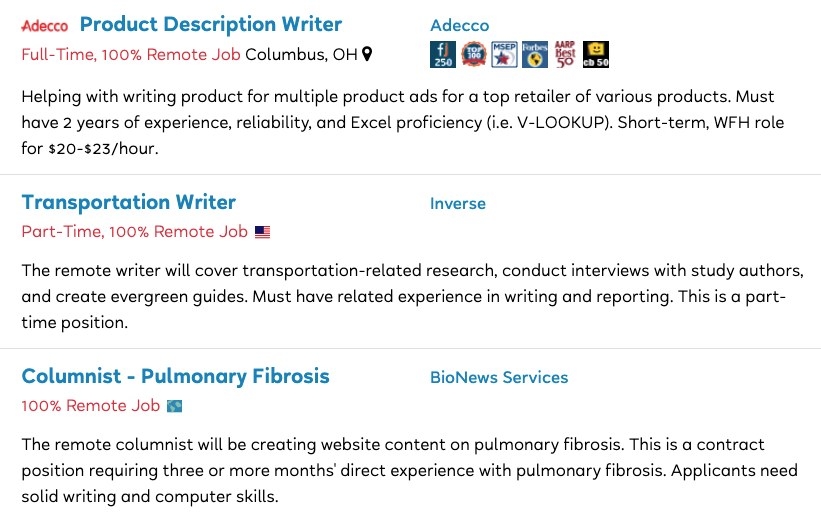
FlexJobs
15.
HR and Recruiting
Comedy Central / Via giphy.com
People who work in human resources and recruiting are needed in almost every company, across all industries. In the people-driven HR world, employers like to see candidates with experience training and recruiting, as well as working with benefits (like health insurance and 401(k) programs) and helping people develop their careers.
Experience is king in the world of HR and recruiting, with plenty of job postings focusing more on work history than degrees.
Common job titles: personnel manager, staffing consultant, talent scout, head hunter, and employment manager.
This is what a job might look like for someone who’s new to the industry:
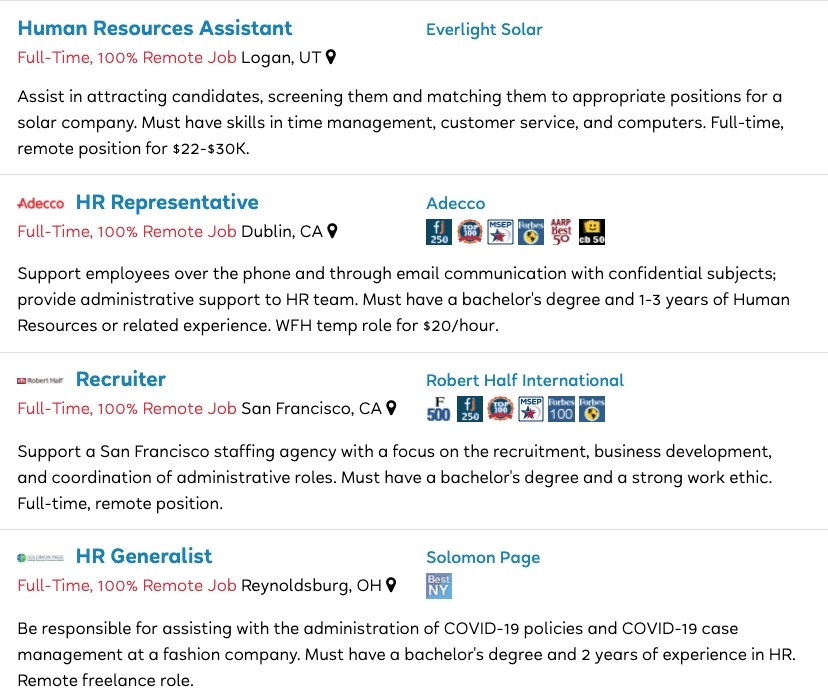
FlexJobs
If you’re searching for a job currently or thinking about making career moves, we hope having this data in your pocket is helpful! And if you’ve got money on your mind, check out more of our personal finance posts.
[ad_2]
Source link








